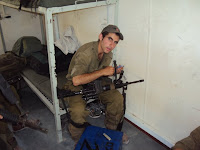

I am sitting right now in the Ben Gurion Airport about 1.5 hours away from departure time. I, once again, scanned over all of my previous blog entries in order to see how far I've come since the beginning and since my 1 year reflection. I mentioned in previous entries that it's hard for me to chart my progress and changes but this time looking back I realize how much I've changed. I don't know even know where to start so I think the most appropriate way of going about this is just to state my present views and juxtapose them with comments and notions from earlier. First of all, my English has gotten rusty. Obviously it's still my native tongue, but I wrote so well and with satirical and rich style in my first blogs. What's happened? I think maybe this has to do in part with the "Israelis not mincing words" blog I wrote about 1.5 years ago. My day-to-day life over the past 9 months has been almost entirely in Hebrew in Israelis my age. As a result my Hebrew has improved exponentially and I am able to relate and communicate freely without almost any cultural or lingual barriers with my piers here. It's bizarre because 2 years I yearned so much to speak fluently and be Israeli and now that that has happened more or less, I hardly even notice it because it is routine. Catch 22? Looking back on my views and opinions from 2008 was exciting because it is as if I was reading those of another person; when I then shifted back to my present mind it was like seeing my accomplishments take place within seconds. Since I've come to Israel, I've learned to be much more patient and accepting.
One of the things that I most proud of myself is that there does not pass one day while I'm in the army where I regret the decisions I've made about making Aliyah and joining the army. I don't know a single person that loves and enjoys the conditions and situation in the army but there are two ways of going about it. One is that you can endure the hardships that are thrown at you and complain about it the whole way and tell everybody who asks that you are suffering and that the army sucks. This is the "gisha" or attitude of many soldiers. The second way is to know that you are going to suffer but to be okay with it. To embrace the hardships and not complain. Despite the fact I do suffer in the army, and it is difficult, and it is not glorious or rewarding most of the time, I am fulfilling something I believe in and whatever happens along the way is irrelevant. Of course I have my moments where I give in to whining and bitching with the guys but about 20 times a day I try to remind myself to stay positive and be okay with sacrifice I'm making in order to do what I believe in.
The things I used to comment on in my posts 2 years ago seem so trivial and funny now -- the rust on the shower head, the food in the Kibbutz dining hall, the lack of timely maintenance services on kibbutz, "only" getting 6.5 hours of sleep. All these things are not concerns of mine anymore. There are things that concern me now that in another 2 years I will probably laugh at. One thing I have observed about the army is that there is always someone more "vatik" or experienced than you. So how do you go about not coming off as an ass when talking to someone more experienced than you? You listen and ask questions and don't complain and don't act like a know-it-all. The way the chain of experience goes in the army is as follows: new recruits, soldiers in advanced training, soldiers in plugat maslul (once you have your red beret and are on the border but still not vatik), and then the various stages of older soldiers. Then there are the officers who sign on extra time, then those who have gone through and experienced war, and finally those who have experienced multiple wars. Sometimes when I think that I've gone through a lot (and I think I'm justified in saying I have) I then think of those who fought in the Intifada in 2000 and the Lebanon War and once again am humbled and grounded. Such is the chain of wisdom and experience everywhere in life, it is just a matter of adjusting the mindset to the present situation and realizing that to be quiet and observant and humble is the wisest approach in any situation at any stage.

1 comment:
Hey and Shalom Ben!
First: Kol ha kavod!
Thanks for your blog and all the memories and emotions it brought up in me. Like you I passed through kibbuz ulpan, oleh Chadash, the army, 202 et al. But my gius was february '72. I ended up a sergeant in hadracha with machsor mai 73, and came out after the Yom Kippur war.
All the best to you, you did the right thing. May HaShem bless you.
David
Post a Comment